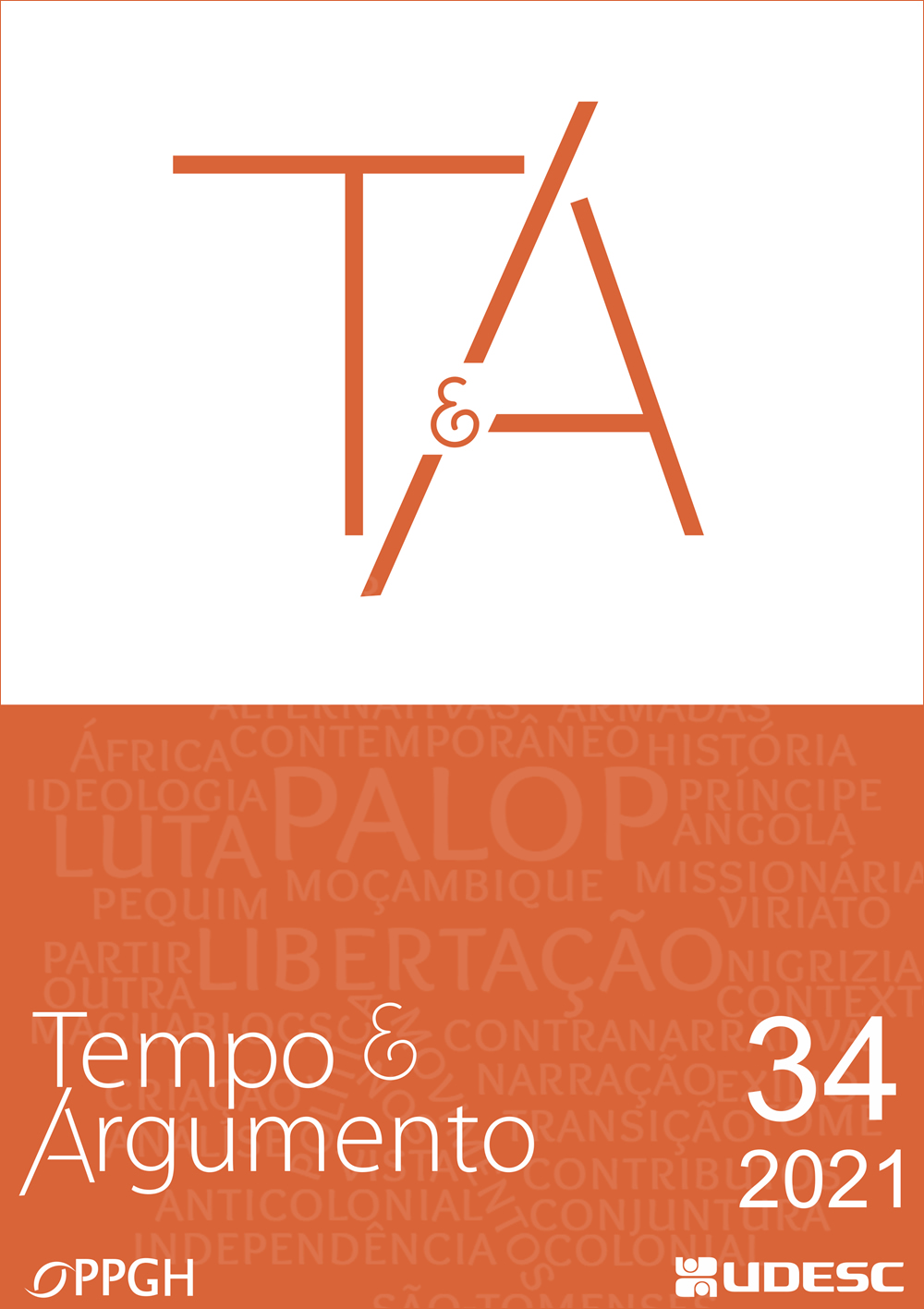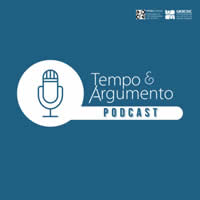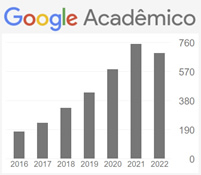La guerra civil española en el cine como fuente historiográfica: la Andalucía del filme La Trinchera Infinita (2019) y la reconstrucción digital de un fascismo invisible
DOI:
https://doi.org/10.5965/2175180313342021e0204Resumo
Desde la segunda mitad del siglo XX, la cultura digital ha supuesto un revulsivo en el oficio de historiador, que ha encontrado otros cauces para la divulgación de su trabajo. Ello es especialmente visible en el cine de la nueva era Netflix, con una nueva mirada que, desde la microhistoria, busca acercarse a las grandes epopeyas de los acontecimientos, centrándose en quienes los padecen. Analizaremos el premiado filme vasco-andaluz La Trinchera Infinita (2019), centrado en la Guerra Civil española (1931-1939), para reflexionar sobre la construcción de un guion de ficción basado íntegramente en unas historias reales, recogidas en un libro periodístico de 1977. El filme representa el fascismo invisible, en una narración donde la ausencia y la sombra son un personaje más. Y donde gracias a la tecnología digital, se ha conseguido articular un relato que trasciende el hecho de la contienda, hablando, en general, de los miedos de la mente, de la soledad, del riesgo de la autoexclusión de quien mira el mundo a través de un agujero.
Palabras clave: historia; cine; guerra civil española; literatura; periodismo de guerra.
Downloads
Referências
ARONICA, Daniela. La Guerra Civil Española en la propaganda fascista. Noticiarios y documentales italianos (1936-1943). Valencia: Shangrilá. 2017.
BLANCO PÉREZ, Manuel. Nuevo Cine Andaluz. Salamanca: Comunicación Social, 2020a.
BLANCO PÉREZ, Manuel. Cine y Semiótica. Salamanca: Universidad de Salamanca, 2020b.
BLANCO PÉREZ, Manuel. El cine y la semiótica Transdiscursiva. Comunicación y Sociedad, Núm. 19. 2021. DOI: https://doi.org/10.32870/cys.v2021.7886
BLANCO PÉREZ, Manuel; GONZÁLEZ VILALTA, Arnau. La Barcelona de la Guerra Civil española a través de la mirada de Antoni Campañà. Análisis fotográfico e histórico. Historia y Comunicación Social, Núm. 25 (2). 2020. http://dx.doi.org/10.5209/hics.69993
BALLETTA, Edoardo. Ausencia, resto, objeto: una propuesta de lectura de la fotografía argentina postdictadura. Kamchatka, Núm. 6. 2015. DOI: https://doi.org/10.7203/KAM.6.7101
BRESCIANO, Juan Andrés. La Historia local en tiempos de Internet. Nuevos cauces para una especialización disciplinaria. Revista Tempo e Argumento, Florianópolis, v. 6, n. 12. 2014.
CABEZA, José. La narrativa invencible. El cine de Hollywood en Madrid durante la guerra civil española. Madrid: Cátedra. 2009.
CARRERA, Pilar y TALENS, Jenaro. El relato documental. Madrid: Cátedra. 2018.
CASETTI, Francesco y DI CHIO, Federico. Cómo analizar un filme. Barcelona: Planeta. 1991.
CIPOLLA, Carlo. ¿Quién rompió las rejas de Monte Lupo? Buenos Aires: Muchnik. 1977.
COELHO, Ilanil; SOSSAI, Fernando Cesar. Aproximações entre história pública e história oral: o caso do Laboratório de História Oral da Univille. Revista Tempo e Argumento, Florianópolis, v. 8, n. 19, p. 96 ‐ 129. set./dez. 2016.
DOI: 10.5965/2175180308192016096
CRUSELLS, Magí. La guerra civil española: cine y propaganda. Madrid: Ariel.
ESPINOSA, Francisco. La columna de la muerte: el avance del ejército franquista de Sevilla a Badajoz. Madrid: Crítica. 2003.
ESPINOSA, Francisco. Por la sagrada causa nacional. Historias de un tiempo oscuro. Madrid: Crítica. 2021.
FRASER, Ronald. Escondido: el calvario de Manuel Cortés. Madrid: Crítica. 2006.
GUERRA GUERRA, Sonia. La guerra civil española en el cine del Popular Front (1936-1939). Valencia: Universidad de Valencia.
GINZBURG, Carlo. El queso y los gusanos. Barcelona: Península. 1981.
IGLESIAS RODRÍGUEZ, Juan José. Violencia y conflicto en la Andalucía atlántica moderna. Les Cahiers de Framespa. Núm. 12. 2013. DOI : https://doi.org/10.4000/framespa.2190
JACKSON, Gabriel. La República Española y la Guerra Civil. México DF: Grijalbo. 1967.
LEVI, Giovanni. La herencia inmaterial. Madrid: Nerea. 1985.
MAESTRE, Antonio. Franquismo S.A. Madrid: Akal. 2020.
MEDINA CANO, Federico. La trinchera infinita: la guerra que no cesa. Comunicación. Núm. 42. 2020 DOI: http://dx.doi.org/10.18566/comunica.n42.a05
MOINE, Raphaëlle. Les genres du cinema. Paris: Nathan. 2002.
PALACIO ARRANZ, Manuel. Estudios Culturales y cine en España. Comunicar, no 29, v. XV. 2007. DOI: https://doi.org/10.3916/C29-2007-10
PRESTON, Paul. Un pueblo traicionado. Madrid: Debate. 2019.
SÁNCHEZ-BIOSCA, Vicente. Cine de historia, cine de memoria: la representación y sus límites. Madrid: Crítica. 2006.
VIÑAS, Ángel. La soledad de la República. Madrid: Crítica. 2006.
VIÑAS, Ángel. El gran error de la República. Madrid: Crítica. 2021.
ZUNZUNEGUI, Santos. Acerca del análisis fílmico: el estado de las cosas. Comunicar, Núm. 29, 2007. https://doi.org/10.3916/C29-2007-07
Downloads
Publicado
Como Citar
Edição
Seção
Licença
Copyright (c) 2021 Revista Tempo e Argumento

Este trabalho está licenciado sob uma licença Creative Commons Attribution-NonCommercial 4.0 International License.
Os artigos cujos autores são identificados representam a expressão do ponto de vista de seus autores e não a posição oficial da Tempo e Argumento.





